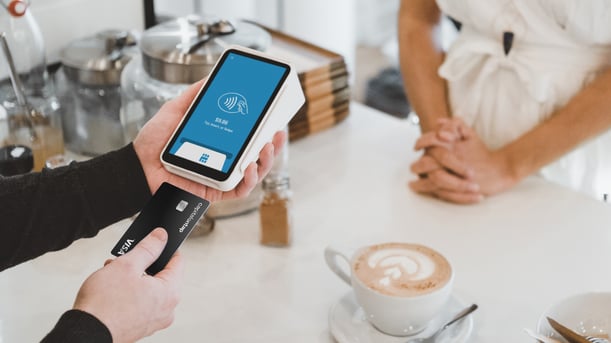Jump to a section
Small business owners have a lot of options when it comes to business vs personal credit cards. Do you really need a business credit card when you already have a personal credit card you love? And if you do, with so many options, which one is right for you? In this blog post, we break down business vs personal credit cards so you can make an informed decision for your business.
What are the main differences between business and personal credit cards?
1. Credit limits
Business credit cards will typically come with higher limits since this is based on a business’s annual revenue and spending, rather than the individual’s. The Capital on Tap Business Credit Card, issued by WebBank, offers credit limits of up to $50,000.
2. Credit reporting
Business vs personal credit cards report to separate credit bureaus, which is why business credit scores and personal credit scores are kept separately. The main business credit bureaus are Dun and Bradstreet, Experian Business, and Equifax Small Business. The main personal credit bureaus are Equifax, Experian, and TransUnion.
Most small business credit cards (including the Capital on Tap Business Credit Card), do not report to personal credit bureaus unless the business fails to pay their credit card bill. In this case, your personal credit score can be impacted by your business credit, which is why it’s so important to pay on time.
3. Bonus and rewards
Because more money is typically moving in and out of businesses than personal accounts, business credit cards are typically able to offer more attractive bonuses and rewards. For example, The Capital on Tap Business Credit Card offers unlimited 1.5% cash back on all purchases. Switch to weekly AutoPay to maximize your rewards at 2% cash back.
4. Perks
Similarly, business credit cards are able to provide ample perks for credit card holders due to business spend being higher than personal spend. These can include anything from travel and gift card rewards, to accounting integrations, end-of-year itemized reporting, and other tools to help with business management.
The Capital on Tap Business Credit Card allows you to redeem your points for travel and gift card rewards, including Uber, Airbnb, and more. It also offers no-cost cards for all your employees, allowing you to manage all business spend in one place.
5. Bookkeeping
One of the main benefits of a business credit card is that you can keep any business expenses separate, which makes life much easier come tax season. Business credit cards also often provide more robust itemized reporting on business spend, and many will even integrate with your business’s accounting software.
If you are making business purchases through a personal credit card, your business expenses can often overlap with your regular non-business expenses, making your accounting a bit more of a hassle.
6. Interest rates
Interest rates vary widely between different providers, regardless of if you’re looking at business vs personal credit cards. Carrying a balance on an interest bearing credit card can be costly regardless of it being for business or personal spend.
7. Separate lines of credit
Business vs. personal credit cards offer separate lines of credit. Your business credit card funds your business whereas your personal credit card funds everything else. Maintaining separate lines of credit can be immensely beneficial both to your bookkeeping practices, as well as building up both business and personal credit.
While you can use a personal credit card for business expenses, doing so will not help you build business credit. The reverse, however, is not true. You can’t use a business credit card to pay for personal expenses. Therefore, it’s essential to maintain separate lines of credit.
Do you have to use a business credit card for business?
Yes, a business credit card must be used exclusively for business expenses. Should you use a business credit card for anything else, you risk your credit card being closed, decreases to both your business and personal credit scores, the loss of consumer protections, and ultimately greater costs in the long-term.
Is a business credit card better than a personal credit card?
If you’re looking for a way to fund your business, a business credit card is far superior to a personal credit card in this capacity. In addition to higher credit limits and more robust rewards, a dedicated line of credit for your business is far more suited to help you grow your business over time than a credit card created for personal use.
When weighing your business vs personal credit card options, make sure to consider the Capital on Tap Business Credit Card. With unlimited free 1.5% cashback, cards for all your employees, and no annual or foreign exchange fees, the Capital on Tap Business Credit Card is custom-made for small businesses.











